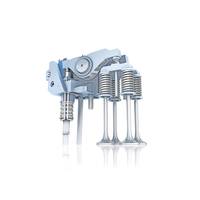ABB, MTU Test VCM System Durability

Durability field-test results of ABB’s variable valve train system, Valve Control Management (VCM), have shown unprecedented success of the technology on an MTU high speed gas engine. The successful running of each VCM actuator for 7,000 hours on an engine is an important milestone for the forthcoming serialization of this technology. Typically, a durability test for serialization lasts around 5,000 hours for large engines. VCM is an electro-hydraulic valve train system for four-stroke gas and diesel engines…
Valve Train Halves Idle to Full Load Time
One of the new tools that engine builders are using these days to reduce fuel consumption and greenhouse gas emissions is Valve Control Management (VCM), ABB’s variable valve train system, more so since duel-fuel engines become an increasingly popular choice by shipowners. Initially introduced in the shore-based gas plant sector, Christoph Rofka, Senior General Manager for New Business at ABB conjectured at that time and with an eye to the future: “A technology like this speaks to the increasing trend to explore dual-fuel options and create solutions for gas. Basically the technology helps a turbocharger to manage air actively and is particularly effective for high-performance engines in which large operating ranges or rapid load responses are required such as tugboats…
ABB Increase Promotion of Valve Control Management
ABB Turbocharging said it will step up its promotion of variable valve train system, Valve Control Management (VCM). VCM helps a turbocharger to manage air actively so that an engine can operate at different speeds, loads and ambient conditions, thereby increasing its range of application and operation. A major market for this technology is gas power plants. VCM offers new options for higher performance engines that need either a wide range of operation or a fast load response, such as on tugboats, off-highway trucks and emergency power generators. Suboptimal air-fuel flow results in greater risk of engine knock, more polluted exhaust and lower efficiency.







